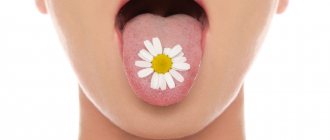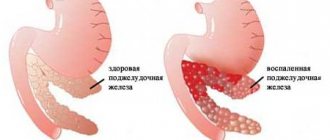Signs of stomach problems
The appearance of bad breath can be associated with a large number of reasons - from caries to pathology of the gastrointestinal tract. To identify the primary disease, the symptom should not be considered in isolation. As a rule, a person has other signs of illness that help make an accurate diagnosis. Doctors identify the following symptoms of stomach diseases:
- pain in the epigastric region, which may intensify when eating or on an empty stomach;
- heartburn, characterized by pain and a burning sensation in the chest;
- belching that is sour or bitter, resulting from the reflux of gastric contents into the esophagus.
Symptoms in each patient are expressed differently, however, when interviewing a person and external examination, the doctor can easily identify them. This helps in making a diagnosis and identifying the causes of stomach odor.
Helpful: Shoulders burnt in the sun, what to do?
What diseases of the gastrointestinal tract can cause bad breath?
With diseases of the digestive organs and intestines in particular, the patient experiences various complaints, including halitosis. Having found out the cause and made the correct diagnosis, the doctor can prescribe competent treatment for the underlying disease, after which the unpleasant odor will go away on its own. You can also use pharmaceutical drugs or folk remedies that will temporarily help mask this problem.
Pancreatitis
Pancreatitis often accompanies bad breath. With chronic inflammation of the pancreas, the aroma and taste in the mouth may be sweet, sour or bitter. The nature of halitosis is determined by the state of health, the form of the disease, the presence of concomitant pathologies, as well as the individual characteristics of the body. In addition to the unpleasant taste and aroma, the patient also experiences other symptoms - nausea, vomiting, increased dry mouth, pain in the epigastric region.
A sweet taste in the mouth with pancreatitis is often not accompanied by other symptoms. But nevertheless, it is the first sign of the development of the disease, since it indicates that the level of sugar in the body is increased, the amount of the hormone insulin is reduced, and the absorption of carbohydrate structures is impaired. If no action is taken after the unpleasant taste appears, over time the level of glucose in the blood will decrease or increase (depending on the type of diabetes - compensated or decompensated) - this is fraught with the development of diabetes mellitus.
The thing is that with an intensely expressed inflammatory process in the pancreas, its performance deteriorates significantly. During the development of pancreatitis, the production of digestive enzymes and insulin decreases, and the digestibility of glucose, which enters the body with food, is impaired. When the body's function of absorption and breakdown of glucose is impaired, the concentration of sugar increases in urine, blood and other biological fluids, including salivary fluid. This explains the presence of a sweet taste in the mouth of a person who suffers from pancreatitis.
To get rid of this symptom, the patient must control blood sugar levels and adhere to a strict low-carbohydrate diet.
Increased blood sugar also contributes to the formation of a sour taste. With an increased concentration of glucose in the salivary fluid, a favorable environment appears for the proliferation of pathogenic microorganisms. During their life, these microbes produce large amounts of lactic acid, which negatively affects the condition of tooth enamel. As a result, it becomes thinner and becomes vulnerable to various diseases. Another reason for this phenomenon can be called dysfunction in the digestive process. If the pancreas does not produce enough enzymes that are needed to break down and absorb food, the entire digestive process is disrupted.
In addition to the appearance of an unpleasant odor and taste, other symptoms appear - heartburn, a burning sensation in the throat, increased acidity, reflux of stomach contents into the esophagus, pain and burning in the epigastrium. Often the development of pancreatitis is accompanied by inflammation of the gallbladder and bile ducts. That is why bitterness is added to dryness. According to statistics, most cases of pancreatitis are accompanied by the development of cholecystitis.
In this case, bitterness and a yellow coating appear on the surface of the tongue, which indicate the process of impaired outflow of bile from the bladder. If severe bitterness and other symptoms appear, you should contact a gastroenterologist as soon as possible and undergo appropriate diagnostic measures, with the help of which doctors will be able to make a diagnosis and prescribe the correct treatment.
Diverticulosis of the colon
Among the causes of unpleasant odor and taste in the mouth are intestinal diverticula. These are small depressions in the cavity of the large intestine. Their presence is sometimes asymptomatic. With intestinal diverticulitis, clinical manifestations such as increased gas formation, pain in the intestines, and disturbances in bowel movements occur, which are manifested by constipation or disorders. Hyperthermia (usually low-grade fever) and bloating also occur.
The development of esophageal diverticulitis is often accompanied by the following symptoms:
- feeling of a lump in the throat;
- regurgitation;
- oral halitosis;
- gurgling sounds in the stomach.
Among the reasons causing this pathology are:
- Age. As the body ages, the risk of developing the disease increases, as intestinal motility gradually decreases and the walls of the intestinal loops weaken.
- Lack of balanced nutrition. With constant fasting, overeating, and improperly designed diets, the risk of developing the disease increases.
- Genetic predisposition.
- Frequent constipation, as a result of which the walls of the intestinal loops weaken. This is also accompanied by the development of hemorrhoids.
It is important to promptly treat illness caused by such reasons. This will remove the unpleasant aroma.
Gastroduodenitis
Gastroduodenitis is often accompanied by halitosis. Such a disease can be caused by high acidity or low acidity, so the doctor can also assume a form of gastritis based on the taste. Hyperacid gastritis is accompanied by a sour smell and taste. Hypoacid gastritis is accompanied by the smell of rotten eggs from the mouth. If you have stomach problems, your breath usually smells constantly and intensely.
When the gastric mucosa is inflamed, the process of breaking down food is disrupted, especially if the diet contains a large amount of protein foods. The reasons for the development of this disease include:
- unhealthy diet, frequent overeating, dry snacks, excessive consumption of alcoholic beverages;
- additional pathologies of the digestive system;
- weakened immune system, due to which the bacterium Helicobacter pylori begins to actively develop and multiply.
In addition to halitosis, the development of gastritis or gastroduodenitis is accompanied by sour or bitter belching, intense dull or aching pain in the epigastric region, a dense yellow or white coating on the surface of the tongue, reflux esophagitis, heartburn, nausea or vomiting, and hyperthermia. Gastritis is often accompanied by the development of reflux disease, especially if the hyperacid form of the disease is diagnosed.
Reflux esophagitis
Reflux esophagitis is associated with the reflux of stomach contents into the esophagus. This pathology can cause inflammation of the throat. In addition to the unpleasant smell and taste, the following symptoms of the disease appear: frequent heartburn, sour, burning belching, burning in the stomach, hiccups.
The reasons for the development include:
- disturbances in the function of the esophagus;
- prolonged exposure to stress;
- smoking;
- pregnancy or obesity;
- diaphragmatic hernia;
- unhealthy diet, frequent overeating.
Timely treatment will help you cope with the unpleasant taste.
Diseases of the gallbladder and biliary tract
In the presence of diseases of the biliary system, the following symptoms often appear:
- unpleasant smell and taste (usually bitter);
- attacks of nausea or vomiting;
- pain in the right hypochondrium;
- hyperthermia;
- unpleasant belching.
When cholecystitis develops, it is important to carry out treatment on time, since gallstones are dangerous to health. Surgery is often required to get rid of them.
Constipation
If chronic constipation is present, the smell often accompanies a person's life. This is due to the processes of stagnation of feces in the intestines. Due to this, the process of breakdown and absorption of food is disrupted. This causes putrefactive processes. They manifest themselves as halitosis.
To rid the oral cavity of such a problem, it is necessary to monitor timely bowel movements and, if necessary, take medications prescribed by the doctor.
Intestinal dysbiosis
Bad breath often accompanies dysbacteriosis. This is due to dysbiosis in the microflora of the intestinal tract. In this case, pathogenic microflora prevails over opportunistic microflora. The following symptoms appear: halitosis, intestinal disorder, intestinal pain, nausea, weight loss, belching. The digestion process worsens.
Causes of unpleasant odor
Bad breath from the stomach occurs as a result of several reasons:
- reflux of gastric juice into the esophagus;
- decreased motor function of the stomach, as a result of which food remains in the lumen of the organ for a long time;
- with reduced acidity of gastric juice, the food bolus moves through the intestines for a long time, which leads to the onset of putrefactive processes in it;
- eating garlic, onions and other foods with a specific smell.
In addition to stomach diseases, bad breath can be associated with damage to the teeth and soft tissues of the oral cavity. In this case, one patient may have several pathologies that provoke the appearance of an unpleasant symptom.
Types of halitosis
Halitosis is a clinical symptom characterized by the appearance of bad breath in a person, which is not eliminated by brushing teeth and other hygiene procedures. Doctors divide it into several options:
- the true form is characterized by a pronounced odor from the oral cavity. Patients complain of foul-smelling belching. Hygienic measures and dental treatment do not eliminate this symptom. In true halitosis, the cause of the odor is associated with diseases of the gastrointestinal tract;
- the false form, or pseudohalitosis, is characterized by the periodic appearance of an odor. The main reasons are improper oral hygiene and disrupted eating habits. There are no symptoms of pathology of the gastrointestinal tract;
- Halitophobia is an obsessive condition in which a person believes that his breath smells bad. Unpleasant odor is associated with a lack of regular hygienic brushing of teeth.
Depending on the specific type of halitosis, hygienic and therapeutic measures are selected.
Useful: Anti-allergenic diet
Causes of dryness and bitterness in the mouth with pancreatitis
Dry mouth, or xerostomia, usually occurs when saliva production stops or decreases. This symptom can manifest itself both in pathology of the salivary glands and in other serious organic diseases, which include chronic biliary pancreatitis. The inflammatory process in the pancreas is often caused by cholecystitis or cholelithiasis (GSD), when bile, as a result of impaired outflow, is carried into the organ, irritating its tissues. In this case, bitterness and a yellow coating on the tongue are added to the symptom of dryness.
Often, bitterness and dryness felt in the oral cavity are the first warning signs of disease of the gallbladder and its ducts, as well as accompanying chronic pancreatitis.
Inflammation of the pancreas is accompanied by digestive disorders due to a malfunction in the exocrine function of the organ and a deficiency of food enzymes. Patients with pancreatitis often suffer from diarrhea, which leads to dehydration and a feeling of dryness and bitterness in the mouth.
In chronic pancreatitis, the inflamed and therefore swollen pancreas does not produce enough of the hormone insulin into the blood, so the level of glucose in the bloodstream increases, exceeding the permissible norm, which causes thirst and dryness in the mouth.
Bad breath due to inflammation of the pancreas
Bad breath or a symptom of unpleasant, foreign, often foul breath in medicine is usually called the term halitosis. The reasons for this phenomenon are of two types:
- physiological (morning odor from the mouth before brushing your teeth or breath after eating garlic or onions);
- pathological halitosis, caused by a disease of the internal organs. This syndrome is observed in a quarter of the world's population. Neither chewing gum nor refreshing sprays are able to cope with this problem, which significantly reduces the patient’s level of full life.
With chronic inflammation of the pancreas, a patient's breath may have a persistent bitter odor or a sweetish odor of acetone, indicating gallbladder disease or an increased concentration of glucose in the bloodstream.
Taste in the mouth with pancreatitis
A sweetish taste in the mouth appears when the carbohydrate balance in the body is disturbed and, at the same time, the production of insulin, which processes glucose, is inhibited. A deficiency of this hormone involves the accumulation of sugar in a person’s lymphatic fluid, thereby penetrating into the oral cavity, and this is possible with pancreatitis. During this period, the pancreas exhibits increased vulnerability and its endocrine part, consisting of pancreatic islets, becomes inflamed. The taste in the mouth may also be sweet and sour - in this case, the movement of enzymes responsible for the breakdown of consumed food is disrupted in the diseased organ.
Disruption of the pancreas, and with it the intestinal microflora, causes the patient some discomfort, namely sour mouth, heartburn, nausea, heaviness in the abdomen. When the acidic contents of the stomach enter the digestive tract, a modification of the pancreas occurs, and the harbinger of this is an improper human diet. Everyone has a chance for a full recovery if, at the initial stage of the disease, a person seeks help from a gastroenterologist. For prevention purposes, you need to adjust your menu in consultation with a registered nutritionist.
Gastrointestinal diseases that cause odor
The cause of the development of true halitosis is pathology of the gastrointestinal tract.
Bad breath is observed in the following gastrointestinal diseases:
- chronic gastritis and gastric ulcer.
Both diseases are characterized by the development of inflammatory changes in the wall of the organ and dysfunction of the cardiac sphincter, located at the border of the esophagus and stomach. As a result of this, the smell from the stomach and intestines freely enters the oral cavity, causing the appearance of the symptom; - inflammatory diseases of the small and large intestines (enteritis and colitis, respectively) are characterized by the formation of a large amount of toxic substances. They can either enter the stomach when the pyloric sphincter is disrupted, or be absorbed into the circulatory system and excreted in the lungs, leading to halitosis;
- diseases of the liver and pancreas disrupt the digestive process, leading to insufficient digestion of food components. As a result of this, putrefactive processes occur in the intestines, which, with concomitant diseases of the stomach, may be accompanied by bad breath. In addition, liver damage itself leads to the appearance of halitosis, as metabolic products begin to be excreted through the lungs.
In addition to halitosis, gastrointestinal diseases are accompanied by other symptoms, which allows the doctor to determine the examination tactics and select treatment.
How to get rid of stomach odor?
Doctors know well how to get rid of odor from the stomach. To do this, it is necessary to eliminate the immediate cause of halitosis. For this purpose, medicines, nutritional therapy and traditional medicine can be used.
Pharmacy drugs
The main cause of halitosis is gastritis and gastric ulcer. To treat them and eliminate the unpleasant odor, complex therapy is used to restore the mucous membrane of the organ and prevent the progression of inflammatory changes in it.
Gastroenterologists prescribe the following tablets for their patients against bad breath from the stomach:
- antibacterial drugs aimed at destroying the pathogenic bacterium Helicobacter pylori, which causes chronic gastritis and peptic ulcers. Patients are recommended to use Amoxicillin and Azithromycin, which have high activity against this pathogen. Antibiotics are used in a course of 7-10 days. Before using antibacterial agents and at the end of treatment, the patient is examined for the presence of pathogenic bacteria in the stomach;
- To reduce the acidity level of gastric juice, proton pump inhibitors are used - Omeprazole and Omez. The drugs are recommended for all patients with peptic ulcers and gastritis, as they prevent the progression of diseases and the development of complications;
- enveloping medications (Almagel, Maalox, etc.) cover the gastric mucosa with a thin film that protects it from gastric juice and the mechanical effects of food. In addition, Maalox has bactericidal activity against Helicobacter pylori;
- for concomitant liver diseases, hepatoprotectors are prescribed. Ursosan has proven effectiveness, improving the functioning of liver cells and accelerating the excretion of bile. The drug is used for one month. Repeated courses of therapy can be carried out after six months;
- chronic pancreatitis, accompanied by gastritis or peptic ulcer, is an indication for the prescription of enzyme preparations (Gastal, Festal, etc.) to accelerate the digestion of food in the intestines.
All medications have contraindications. To identify them in a person, you should consult a specialist.
Medical nutrition
The normal functioning of the gastrointestinal tract depends on diet. Therefore, doctors recommend that all patients with bad breath adhere to the following dietary tips:
- reduce consumption of milk, cottage cheese, strong tea and caffeinated drinks. They stimulate the development of putrefactive processes by changing the level of acidity of gastric juice;
- You should avoid eating simple carbohydrates and sugar. They stimulate the proliferation of bacterial microflora in the gastrointestinal tract, which can cause halitosis;
- products that enhance fermentation (grapes, plums, sour apples) should be limited;
- in the diet, increase the amount of kefir and other fermented milk products enriched with bifidobacteria. This normalizes the microflora in the digestive tract and helps get rid of the symptoms of its diseases;
- You should eat sweet fruits and vegetables that contain large amounts of vitamins, minerals and fiber. These substances improve digestion and normalize the motor function of the gastrointestinal tract;
- Every day, best for breakfast, eat porridge with dried fruits. These foods are rich in fiber and microelements.
To select the optimal diet for diseases of the gastrointestinal tract, you should consult your doctor or nutritionist.
Traditional medicine
Traditional medicine methods are used with the consent of the attending physician, since they do not have evidence of their effectiveness. The following folk remedies can be used to eliminate bad breath from the stomach:
- saline solution prepared at the rate of 1 tbsp. for 500 ml. warm water. The prepared solution is consumed on an empty stomach immediately after waking up. It reduces inflammation in the gastric mucosa and eliminates halitosis. Duration of treatment - 4-5 days;
- a drink made from ginger root, which is pre-ground to powder and dissolved in boiling water. Before use, cool the solution and drink half a teaspoon before meals;
- infusion of strawberry, mint and blackberry leaves. You need to take 1 tbsp. l. dried leaves and pour 1 cup of boiling water over them. The drink is infused for 12-14 hours. After filtering it, a person drinks it throughout the day in small sips. The infusion does not eliminate the causes of halitosis, however, it relieves the patient of the unpleasant odor;
- wormwood infusion, which is prepared as follows: 2 tbsp. l. dry herbs pour 200 ml. boiling water and leave for 7 days. After filtration, a person drinks 2 tbsp every four hours. infusion.
Traditional medicine methods should not be used as the only method of treatment. They should complement ongoing drug therapy.
How to get rid of the unpleasant specific smell and taste from the mouth due to pancreatitis?
It should be remembered that treatment will be associated with eliminating not the consequences in the form of a taste in the mouth, but the symptoms of the disease that became the cause.
First, you will need to undergo a full diagnosis in order to provide the attending physician with a complete picture of the disease. After this, the patient will be prescribed therapy that will help cope with the inflammatory process of the pancreas.
An integrated approach to the treatment of pancreatitis will also help to avoid such unpleasant symptoms as a coating on the tongue, a lump in the throat and a characteristic taste in the mouth. Medications play an important role in the treatment process, but do not forget about some rules of a healthy lifestyle, it is necessary:
- follow a diet during periods of exacerbation;
- eat rationally and balanced;
- give up bad habits (alcohol, smoking);
- systematically give the body small physical activities;
- have a good rest;
- develop a stable attitude towards stress, do not worry about trifles;
- do not forget about mandatory visits to your doctor;
- lead a calm, measured life;
- undergo regular treatment in sanatoriums, etc.
If the taste does not go away for a long time, the specialist will select other medications that are most suitable in this case.
In addition, it is necessary to pay close attention to the appearance of a sweetish taste in the mouth during pancreatitis. Blood sugar levels should be monitored to prevent diabetes from developing due to pancreatic disease.
- Using the monastery collection to treat pancreatitis
You will be surprised how quickly the disease recedes. Take care of your pancreas! Over 10,000 people have noticed significant improvements in their health simply by drinking a morning drink...
Do they take you into the army with pancreatitis?
Completion of military service directly depends on the health status of the conscript, the form of the disease and the functioning of the pancreas
Development of diabetes mellitus against the background of pancreatitis
To restore the functions of the pancreas and normalize the body’s condition, the patient must strictly control the consumption of easily digestible carbohydrates and fats
Psychosomatics of pancreatitis
The occurrence of this disease largely depends on a person’s diet, but there are also psychological causes of pancreatitis
Parenchymal pancreatitis
One of the main manifestations of the disease is that the patient loses weight sharply and quickly, since due to improper functioning of the pancreas, many foods are not absorbed by the body
Pancreatitis is a dangerous disease from a medical point of view and tiresome in everyday life. The person is prohibited from eating their favorite foods, a diet is prescribed, and the patient feels unwell. A constant bitter taste appears in the oral cavity, and doctors are unable to give clear recommendations to get rid of the unpleasant taste.
Prevention of the problem
To prevent bad breath from the stomach, you must adhere to the following recommendations:
- nutrition should be regular and rational. Products that promote putrefactive processes and the growth of microorganisms should be excluded from it;
- During the day you need to drink 1.5-2 liters of liquid, as water is necessary for normal digestion;
- if you have diseases of the gastrointestinal tract, you should promptly seek medical help and follow the doctor’s instructions for the treatment of pathologies;
- Take proper care of your oral cavity and visit the dentist regularly.
Simple changes in diet and hygiene can prevent halitosis, which causes great discomfort for a person.









